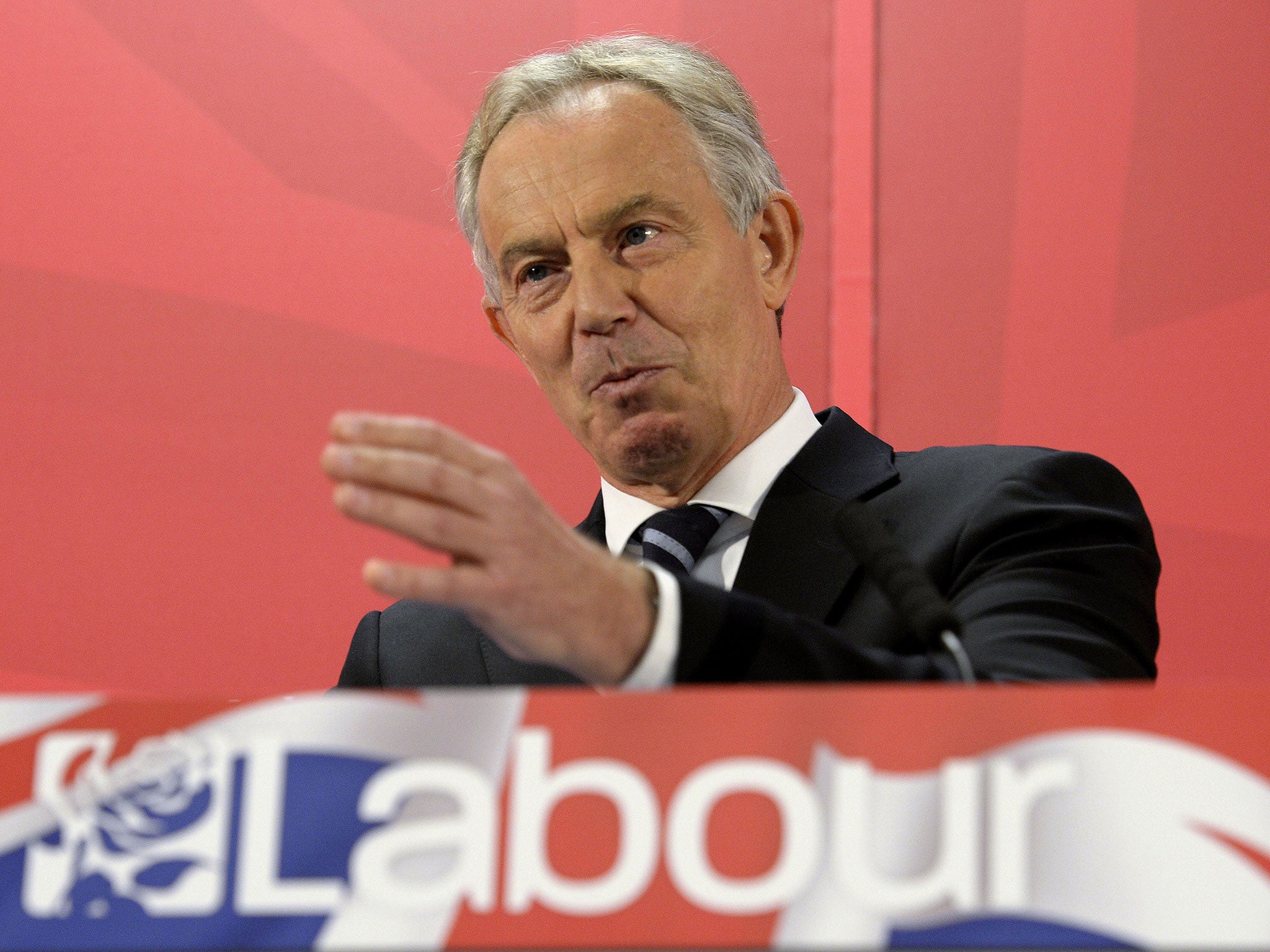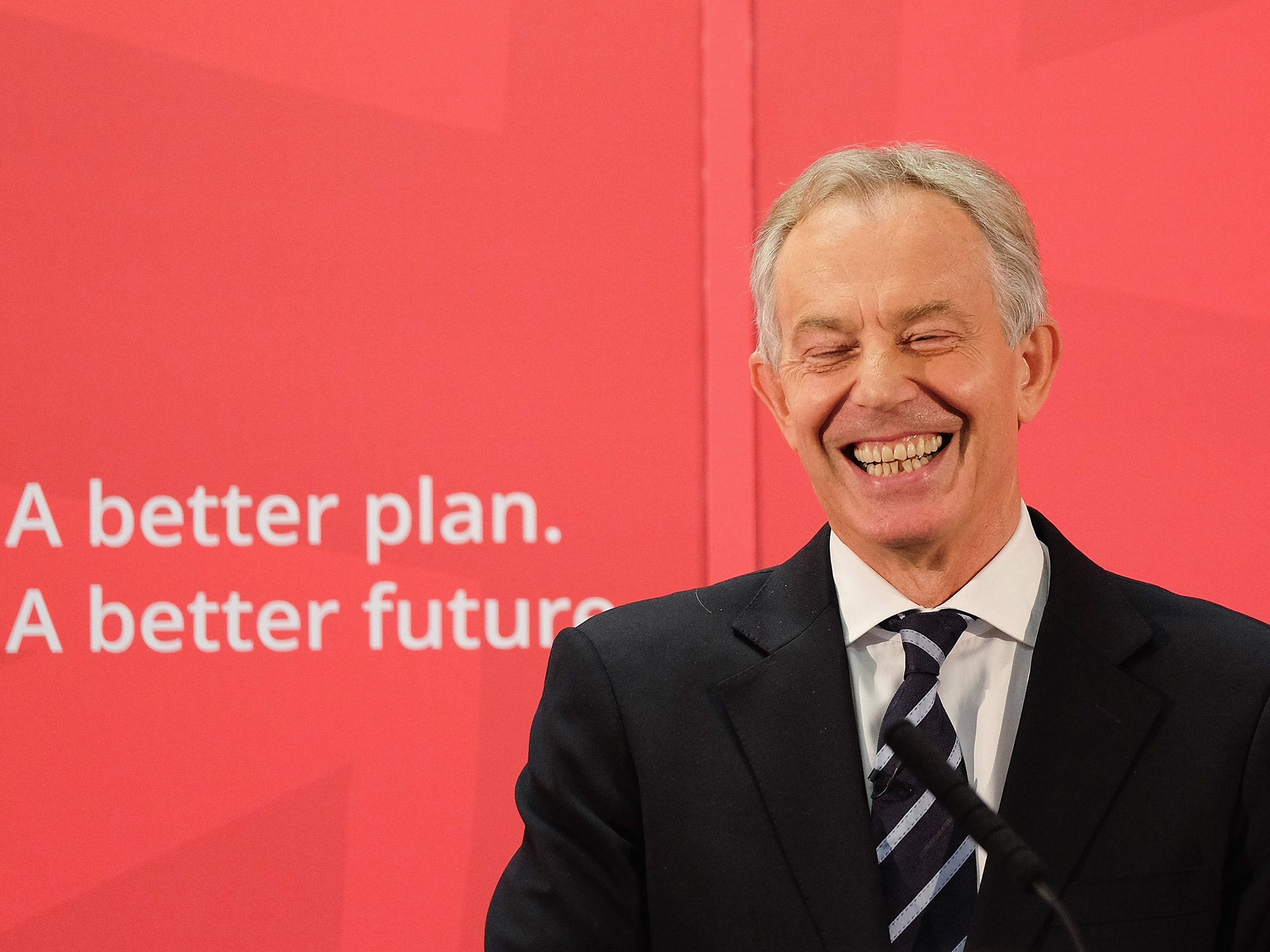I don’t agree with Tony Blair on Europe. But I’ll thank him for delivering Ukip more voters
You have to be 57 years of age to have last voted on the EU, and who knows how much longer it will be if it were up to Tony

Your support helps us to tell the story
From reproductive rights to climate change to Big Tech, The Independent is on the ground when the story is developing. Whether it's investigating the financials of Elon Musk's pro-Trump PAC or producing our latest documentary, 'The A Word', which shines a light on the American women fighting for reproductive rights, we know how important it is to parse out the facts from the messaging.
At such a critical moment in US history, we need reporters on the ground. Your donation allows us to keep sending journalists to speak to both sides of the story.
The Independent is trusted by Americans across the entire political spectrum. And unlike many other quality news outlets, we choose not to lock Americans out of our reporting and analysis with paywalls. We believe quality journalism should be available to everyone, paid for by those who can afford it.
Your support makes all the difference.I was pretty pleased that Tony Blair chose to make an intervention on the European Union this week. Of course, I don’t agree with a single word he said, but Britain’s continued EU membership is a significant issue at this election, and it’s painful to watch the establishment politicians try and run away from it.
The reason it is so important is that our EU membership affects nearly all the issues that the pollsters show the British public to be most concerned about. It affects immigration, because EU rules dictate that we must have open borders to remain members. It affects our NHS, because the EU’s corporate stitch-up – the “Transatlantic Trade and Investment Partnership” – will allow for NHS privatisation by the back door. And it affects the economy, because EU regulations are constraining our small and medium businesses, at the same time as it costs us £8bn a year.
And yet before Ukip came along and started upsetting the Westminster apple cart, no one wanted to talk about it. Now Mr Cameron is back where he was in 2009, promising a referendum – a “pretenderendum” as my colleague Douglas Carswell calls it – that he has no intention of giving the British public.
And I have to say, knowing the audience I’m writing for, that whether you agree with me or not on our place in Europe, you surely have to concede that it’s time the public had a say. You have to be 57 years of age to have last voted on our involvement with the EU, and the last time we did vote, it was on the principle of the Common Market, not the political union that we now have.
Mr Blair’s intervention has, thankfully, thrust the issue back to the fore. He’s obviously very pro-EU, for the same reason the rest of the political establishment are: because the beneficiaries are their friends in big corporations, and those who are ill-affected, mainly the working classes and small business owners, seemingly don’t matter until an election.
Even some of Mr Miliband’s backbenchers know this to be true. Those who don’t toe the party line are willing to stand up, in a group called Labour for a Referendum, and make the case for the average Briton. Unfortunately, it seems like politics has corrupted the Labour ideals for most of his team – who now believe that average people shouldn’t be given a say, lest it affect corporates who are dedicated to, and lobby for, Britain’s continued EU membership.
If you read between the lines, this is exactly what Mr Blair was arguing in favour of. He kept talking about big business. In some cases, these are the same big businesses that Mr Miliband claims he’s not in the pocket of. When they talk about standing up to those who avoid tax, or this whole “non dom” affair – they’re talking about this same circle of people.

If you look at the list of signatories to “Business for a New Europe”, you find big corporate interests at heart. I’m not saying these people are necessarily involved in that which I’ve mentioned above. But they’re hardly the voice of the working man. It’s big banks. It’s big oil. It’s even the London Stock Exchange. Labour has moved so far away from its founding principles, it’s unreal.
This is why more and more Labour voters are moving to Ukip. Because with us they see a party that is both pro-business, and pro-people. The two standpoints are not mutually exclusive, though the wedge of the EU puts a very firm distinction between the two. It is divisive. It sets one group against the other. And Ukip doesn’t want that.
You only have to look at Greece to see how this scenario plays out for the working man or woman. These people have been bullied by the EU, and it has gone so far now that the European institutions treat the democratically elected government of Greece with complete disdain. Greece’s problems originate, largely, from the fact that they joined the euro in the first place. This, if you remember, is exactly what Mr Blair and his allies wanted Britain to do. Ukip opposed it, and I have no doubt that it was the right position to take.
Mr Miliband and Labour continue to follow Mr Blair’s lead, despite all evidence revealing that he was wrong then, and wrong now. If I was being political about this, I’d say thank you, Mr Blair, for driving more Labour voters, and actually more Conservative ones, into the hands of Ukip. But it doesn’t particularly excite me to see our politicians, be they retired or current, still failing to own up to reality – or rather, continuing to dance to the tune of their chums in big business rather than those who elect them.
While the charge comes less often nowadays, sometimes I still get asked “Isn’t Ukip just a single-issue party?” How could we be? When all of the major issues affecting the electorate are in some way related to our continued membership of European institutions? In fact I’d argue that Ukip is the only party with a holistic view of British politics, not willing to ignore certain parts, simply for the sake of cronyism or dogma.
Join our commenting forum
Join thought-provoking conversations, follow other Independent readers and see their replies
Comments